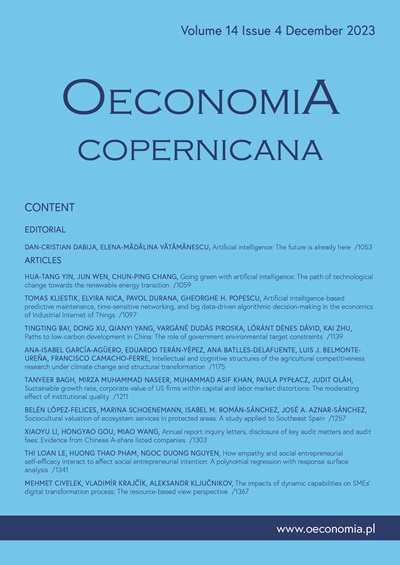Generating loyalty towards fast fashion stores: a cross-generational approach based on store attributes and socio-environmental responsibility
IF 10.8
1区 经济学
Q1 ECONOMICS
引用次数: 10
Abstract
Research background: Faced with multiple media scandals concerning the pollution resulting from manufacturing activities, and encouraging the overconsumption of clothing, international fast fashion retailers have often had to resort to the elaboration and implementation of sustainable strategies aimed at environmental protection and reducing resource consumption. Generating customer satisfaction and loyalty depends increasingly on the extent to which retailers manage to employ socio-environmental responsibility besides the traditional retail store attributes. The purpose of this article: The objective of the paper is to evaluate the influence of consumer-oriented store attributes in generating satisfaction and loyalty towards the fast fashion store, highlighting the influence of socio-environmental responsibility on the two constructs. Methods: Based on the literature review, a conceptual model considering the effects of stores? attributes on store satisfaction and store loyalty and influenced by socio-environmental responsibility is proposed. Data were collected with the help of face-to-face administrated questionnaires before the outbreak of the COVID-19 pandemic in an emerging market (Romania). The data were analyzed via structural equation modeling in SmartPLS, for the three considered consumer generations: Generation X, Millennials and Generation Z. Findings & value added: For all consumer generations, all store attributes contribute to the direct generation of fast fashion store satisfaction and store loyalty; nevertheless, the intensity varies in levels of significance. Socio-environmental responsibility does not significantly determine store satisfaction, but does have a strong influence on fast fashion store loyalty. The results detailed according to the generations indicate a similar situation: each store attribute influences the satisfaction of one or other generation, apart from socio-environmental responsibility. This work makes an essential contribution to the extension of the generational theory, highlighting the various individualities, perceptions, and behaviors. This cross-generational research broadens knowledge on how different consumer generations behave when shopping from fast fashion stores. The research also extends the S-O-R model, which is used to understand the relationship between store attributes (stimulus), consumer satisfaction (organism), and consumer loyalty (response) towards fast fashion stores.培养对快时尚商店的忠诚度:基于商店属性和社会环境责任的跨代方法
研究背景:面对制造业活动造成的污染和鼓励服装过度消费的多起媒体丑闻,国际快时尚零售商往往不得不制定和实施旨在保护环境和减少资源消耗的可持续战略。产生客户满意度和忠诚度越来越取决于零售商在多大程度上除了传统的零售店属性外,还能够运用社会环境责任。本文的目的:本文的目的是评估以消费者为导向的商店属性对快速时尚商店产生满意度和忠诚度的影响,强调社会环境责任对这两个结构的影响。方法:在文献综述的基础上,建立一个考虑商店效应的概念模型?提出了受社会环境责任影响的商店满意度和商店忠诚度的属性。在一个新兴市场(罗马尼亚)爆发新冠肺炎大流行之前,通过面对面管理问卷收集了数据。数据通过SmartPLS中的结构方程模型进行分析,涉及三代消费者:X世代、千禧一代和Z世代。研究结果和附加值:对于所有消费者世代,所有商店属性都有助于直接产生快时尚商店满意度和商店忠诚度;然而,强度在显著性水平上有所不同。社会环境责任并不能显著决定商店的满意度,但对快时尚商店的忠诚度有很大影响。根据几代人的详细结果表明了类似的情况:除了社会环境责任之外,每个商店属性都会影响一代或另一代人的满意度。这部作品对世代理论的延伸做出了重要贡献,突出了各种个性、感知和行为。这项跨代研究拓宽了不同消费者世代在快时尚商店购物时的行为。该研究还扩展了S-O-R模型,该模型用于理解商店属性(刺激)、消费者满意度(有机体)和消费者对快时尚商店的忠诚度(反应)之间的关系。
本文章由计算机程序翻译,如有差异,请以英文原文为准。
求助全文
约1分钟内获得全文
求助全文
来源期刊

Oeconomia Copernicana
ECONOMICS-
CiteScore
13.70
自引率
5.90%
发文量
26
审稿时长
24 weeks
期刊介绍:
The Oeconomia Copernicana is an academic quarterly journal aimed at academicians, economic policymakers, and students studying finance, accounting, management, and economics. It publishes academic articles on contemporary issues in economics, finance, banking, accounting, and management from various research perspectives. The journal's mission is to publish advanced theoretical and empirical research that contributes to the development of these disciplines and has practical relevance. The journal encourages the use of various research methods, including falsification of conventional understanding, theory building through inductive or qualitative research, first empirical testing of theories, meta-analysis with theoretical implications, constructive replication, and a combination of qualitative, quantitative, field, laboratory, and meta-analytic approaches. While the journal prioritizes comprehensive manuscripts that include methodological-based theoretical and empirical research with implications for policymaking, it also welcomes submissions focused solely on theory or methodology.
 求助内容:
求助内容: 应助结果提醒方式:
应助结果提醒方式:


